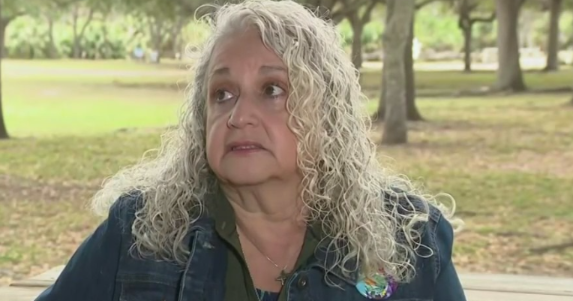Exclusive: Trapped, Inside The Hidden World Of Sex Trafficking
Follow CBSMIAMI.COM: Facebook | Twitter
FORT MYERS (CBSMiami) -- Looking into a reflection of her own eyes, Kyla Massey sees a tormented soul.
A spirit crushed under the weight of memories of the sex acts she was forced to perform. How many men did the 26-year-old have to service on just one typical day?
"Thirty. Forty. Probably more than that," Massey reflected, her eyes dejected and downcast.
She's a young woman whose arms are riddled with bruises and band-aids that hide a litany of horrors. As her fingers gently graze her skin, she traces a graveyard of violence and hurt.
Her imprisonment, she says, included gang rapes, beatings and forced injections of heroin and cocaine. The faces of the men who injected her are a blur.
"It was so many people, " she shares in a whispered voice.
Once trapped in the world she describes as human trafficking, Massey wonders if she can ever truly escape.
But she is speaking out, showing her face and exposing all. Because, as she exclusively tells CBS4 News Chief Investigative Reporter Michele Gillen: "Even if nothing happens for me, I want to help somebody else."
This is the story of that young woman and an advocate, Ramona Miller, without whom Massey may have had no chance of survival. This July, Miller reached out to Gillen.
Based in Fort Meyers, Miller was frustrated with what she described as a lack of answers and help for Massey. She said she'd continuously run into dead ends at every turn across the state.
When asked to describe a headline for Massey's story, Miller responded simply.
"Trapped. I'll just use one word. Trapped."
Miller, who has become a lifeline for Massey, fell into the world of human trafficking by chance. Her life work has been aimed at preventing HIV exposure. She founded the non-profit A Voice in the Wilderness Empowerment Center and launched the "Stay Alive and Thrive" campaign.
These efforts unexpectedly led her to a nexus of modern-day slavery in Florida. In reflecting on the entrapped women she has met, she could only describe them in the haunting manner in which the girls carry themselves.
"I call them Zombies. Beautified zombies," says Miller.
Massey became ensnared, she says, in a Fort Myers ring over a period of weeks. For her, what felt like a lifetime -- the real story behind the headlines of human trafficking -- was a world filled with...
"Sex, drugs and more drugs."
At the beginning, forced heroin injections rendered Massey nearly helpless and leaving her feeling "pretty much like a rag doll." In one case, the injection was a combination of heroin and speed.
"That's what almost killed me," Massey recalled.
If she fought getting the drug injections, she says they would hit her. The needles used were reused on girl after girl.
Shared needles followed by unprotected sex.
"What did you feel like? Did you lose a sense of being a human being?" asked Gillen.
"They got to pick and choose whether or not they wanted to use the condom," says Massey, who adds, they very often did not want to use one.
And she says, the more they were willing to pay for dangerous sex, the more vulnerable to HIV she became.
"That was the worst. It's terrible. I wouldn't wish that on anybody, not even my worst enemy," reflected Massey.
Miller sees it this way, "You are playing with someone's life. That person has become God. They have a decision: do I want to make you pregnant? Do I want to give you HIV?"
Gillen asked if there was any way for the "Johns" to know if she had HIV.
"No," she responded.
And was there any way for her to know if they had HIV?
"No way to know or ask," she told Gillen.
Some of the "Johns" were married, professional men. They wore wedding bands. And in some cases, when she was sent out on a call, they were to expensive homes and hotels.
But most days they were holed up in local Fort Myers motels, pointed out to Gillen as they drove by and walked up to one of the rooms where she has stayed.
"We wouldn't stay at the hotel for more than like 3 or 4 days. They would move us to a totally new, different hotel," explained Massey.
By midday, the traffickers cell phones would rarely stop ringing.
"What would men pay to buy the services of the trafficked girls?" asked Gillen.
"Just for 30 minutes, it would be like 300 dollars. For 30 minutes," Massey remembers.
According to Miller, the girls were treated just like "Animals. Cattle. Put in a place, put in a vehicle, taken from place to place."
Always, Massey says, there was a guard keeping watch. Escape seemed fraught with other perils.
"They threatened us. And I knew if I left, something was gonna happen to somebody that I love and that I cared about."
Who was that person?
"First and foremost, my son," Massey says smiling as she thinks about her 3-year-old son, who lives out-of-state.
Massey credits her shot for a second chance at life to Miller.
"I don't think I would be alive without her," she said, as Gillen met them in Massey's home.
But Miller sees a broken system, where victims are just recycled in search of help.
"Victim. Abused. Trafficked then neglected by law enforcement and every other entity that was supposed to rescue her and give her help," said Miller.
And finding help for a victim of sex trafficking, who's in her 20's, was injected with drugs, and is at risk for HIV? Not easy.
"People with beds said their weren't any for her. That she was too old."
For months, the CBS4 News Investigative team tried to assist Massey in a search for help and answers that could lead to her attackers. Countless calls were made tracing the steps she took since her escape. Calls were made to shelters and law enforcement agencies. For months, CBS4 tried to trace Massey's rape kit. Records show that a medical exam was performed on Massey just hours after her escape.
The team recorded Massey making call after all, a year after the test was done. She asked...
"I would like to know if my rape kit was sent to you?"
"Was it ever analyzed?"
It was a hunt for answers she hoped might lead to information about the men who trafficked and hurt her.
But while Massey physically escaped the world of trafficking, she found there is a bill to be paid. It follows her wherever she goes.
She is now a heroin addict
But while she's in recovery, Massey fears what her next AIDS test might reveal.
"I still think to this day I should have it and I think it's going to pop up. I don't know when," she says.
Asked if she could send a message to the people who held her captive, Miller paused before saying:
"I really just want to be mean and evil and hateful, you know? Like, I want to say mean things. But at the end of the day I feel like if I do that, I'm doing the same thing they did to me, you know? Kinder, but the same thing. And so I would just like to say, I forgive you," shares Massey.
However, her forgiveness is not an emotion that does not replace her desire for justice.
"If you and she don't keep screaming about it do you think anything will happen?" Gillen asked Miller.
"With you, I believe and I pray that you will get this story out there. Not necessarily to get people in trouble but to save those girls who are crying," says Miller.
Gillen has repeatedly reached out to the Lee County Sherrif's office about Massey's case.
According to a law enforcement spokesman, the department could not comment because the Massey case is "an open investigation."
But after continuing to press for answers, CBS4 news has confirmed from the Florida Department of Law Enforcement that Massey's rape kit was sent to them.
When?
As it turns out, just two weeks ago. And according to FDLE it is currently "being processed."
On October 29-30, the Statewide Council on Human Trafficking is gathering at the University of South Florida's Marshall Student Center in Tampa to discuss ways to eliminate the modern-day slavery trade.



